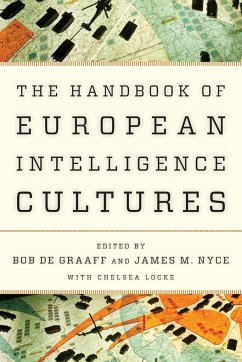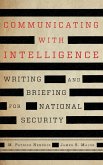Handbook of European Intelligence Cultures
Herausgeber: De Graaff, Bob; Nyce, James M.
Handbook of European Intelligence Cultures
Herausgeber: De Graaff, Bob; Nyce, James M.
- Broschiertes Buch
- Merkliste
- Auf die Merkliste
- Bewerten Bewerten
- Teilen
- Produkt teilen
- Produkterinnerung
- Produkterinnerung
As experts from the countries discussed, the contributors address the intelligence community rather than focusing on a single agency. Each entry looks at the environment in which an organization works, its actors, and cultural and ideological climate, to cover both the external and internal factors that influence a nationâ s intelligence community.
Andere Kunden interessierten sich auch für
![Handbook of European Intelligence Cultures Handbook of European Intelligence Cultures]() Handbook of European Intelligence Cultures163,99 €
Handbook of European Intelligence Cultures163,99 €![The Handbook of African Intelligence Cultures The Handbook of African Intelligence Cultures]() The Handbook of African Intelligence Cultures146,99 €
The Handbook of African Intelligence Cultures146,99 €![An Introduction to Intelligence Research and Analysis An Introduction to Intelligence Research and Analysis]() Jerome ClauserAn Introduction to Intelligence Research and Analysis77,99 €
Jerome ClauserAn Introduction to Intelligence Research and Analysis77,99 €![Communicating with Intelligence Communicating with Intelligence]() M. Patrick HendrixCommunicating with Intelligence80,99 €
M. Patrick HendrixCommunicating with Intelligence80,99 €![Scientific Methods of Inquiry for Intelligence Analysis Scientific Methods of Inquiry for Intelligence Analysis]() Hank PrunckunScientific Methods of Inquiry for Intelligence Analysis82,99 €
Hank PrunckunScientific Methods of Inquiry for Intelligence Analysis82,99 €![Quantitative Intelligence Analysis Quantitative Intelligence Analysis]() Edward WaltzQuantitative Intelligence Analysis118,99 €
Edward WaltzQuantitative Intelligence Analysis118,99 €![Communicating with Intelligence Communicating with Intelligence]() M. Patrick HendrixCommunicating with Intelligence161,99 €
M. Patrick HendrixCommunicating with Intelligence161,99 €-
-
-
As experts from the countries discussed, the contributors address the intelligence community rather than focusing on a single agency. Each entry looks at the environment in which an organization works, its actors, and cultural and ideological climate, to cover both the external and internal factors that influence a nationâ s intelligence community.
Hinweis: Dieser Artikel kann nur an eine deutsche Lieferadresse ausgeliefert werden.
Hinweis: Dieser Artikel kann nur an eine deutsche Lieferadresse ausgeliefert werden.
Produktdetails
- Produktdetails
- Security and Professional Intelligence Education Series
- Verlag: Rowman & Littlefield International
- Seitenzahl: 496
- Erscheinungstermin: 2. März 2018
- Englisch
- Abmessung: 229mm x 152mm x 29mm
- Gewicht: 736g
- ISBN-13: 9781786606570
- ISBN-10: 1786606577
- Artikelnr.: 51141077
- Herstellerkennzeichnung
- Libri GmbH
- Europaallee 1
- 36244 Bad Hersfeld
- gpsr@libri.de
- Security and Professional Intelligence Education Series
- Verlag: Rowman & Littlefield International
- Seitenzahl: 496
- Erscheinungstermin: 2. März 2018
- Englisch
- Abmessung: 229mm x 152mm x 29mm
- Gewicht: 736g
- ISBN-13: 9781786606570
- ISBN-10: 1786606577
- Artikelnr.: 51141077
- Herstellerkennzeichnung
- Libri GmbH
- Europaallee 1
- 36244 Bad Hersfeld
- gpsr@libri.de
Edited by Bob de Graaff and James M. Nyce - With Chelsea Locke
List of abbreviations Introduction (Bob de Graaff & James M. Nyce) Albania: Change and Continuity (Arjan Dyrmishi) Austria: An Intelligence Hub Coming Out of the Shadows (Siegfried Beer) Belgium: A Modern Legal and Policy Framework for Intelligence Services with a Long Tradition (Dirk van Daele) Bosnia and Herzegovina: Historical Development of the Intelligence and Security System (Maid Pajevi
) Bulgaria: A Centenary Unknown History (Jordan Baev) Croatia: Construction and Deconstruction of the Croatian Intelligence Community (1990-2014) (Gordan Akrap & Miroslav Tüman) Czech Republic: The Czech Parth Between Totalitarianism and Democracy (Prokop Tomek) Denmark: From State Security to Security State. The Invention of Preventive Security (Lars Erslev Andersen) Estonia: Intelligence and Security in the 20th Century (Iero Medijainen) Finland: The Intelligence Services in a Cultural and Historical Context (Juho Kotakallio) France: The Intelligence Services' Historical and Cultural Context (Eric Denécé) Germany: An Intelligence Community with a Fraught History (Wolfgang Krieger) Greece: The Need for Modernization in an Unstable Environment (John Nomikos) Iceland: a Small State Learning the Intelligence Ropes (Jakob Thor Kristjansson) Ireland: Plus Ca Change, 1945-2015 (Eunan O'Halpin) Italy: From Secret Services to Intelligence (Marco Lombardi & Laris Gaiser) Lithuania: The Challenge of Merging the Present and the Past (Vaidotas Urbelis) Luxembourg: A Country Which Did Not Need an Intelligence Service? (Gérald Arboit) Montenegro: Trends and Patterns in the intelligence sector (Draen Cerovi
, Nenad Koprivica & Danijela Vujoevi
) The Netherlands: Allmost Full Circle (Bob de Graaff) Norway and the intelligence community: Peaceful State, Crucial Geography, Upheaval and Reform (Njord Wegge) Poland: The Special Services since the Independence (Artur Gruszczak) Portugal: Peculiarities of the Portuguese Intelligence Services (Teresa Rodrigues and José Duarte de Jesus) Romania: An Introduction to its Intelligence Services (Larry L. Watts) Serbia: An Awkward Legacy (Predrag Petrovic) Slovakia: State Security and Intelligence since 1945 (Matej Medvecký, Jergu Sivo) Slovenia: The Intelligence System, Its Development, and Some Key Challenges (Iztok Prezelj) Spain: Intelligence in Context Today (Antonio M. Díaz-Fernández) Sweden: Delicate Liaison (Wilhelm Agrell and Gunilla Eriksson) Switzerland: Intelligence in the New Security Paradigm (Jacques Baud) Ukraine: KGB to Security Service of Ukraine (SBU) (Taras Kuzio) United Kingdom: Organization and Oversight after Snowden (Peter Gill)
) Bulgaria: A Centenary Unknown History (Jordan Baev) Croatia: Construction and Deconstruction of the Croatian Intelligence Community (1990-2014) (Gordan Akrap & Miroslav Tüman) Czech Republic: The Czech Parth Between Totalitarianism and Democracy (Prokop Tomek) Denmark: From State Security to Security State. The Invention of Preventive Security (Lars Erslev Andersen) Estonia: Intelligence and Security in the 20th Century (Iero Medijainen) Finland: The Intelligence Services in a Cultural and Historical Context (Juho Kotakallio) France: The Intelligence Services' Historical and Cultural Context (Eric Denécé) Germany: An Intelligence Community with a Fraught History (Wolfgang Krieger) Greece: The Need for Modernization in an Unstable Environment (John Nomikos) Iceland: a Small State Learning the Intelligence Ropes (Jakob Thor Kristjansson) Ireland: Plus Ca Change, 1945-2015 (Eunan O'Halpin) Italy: From Secret Services to Intelligence (Marco Lombardi & Laris Gaiser) Lithuania: The Challenge of Merging the Present and the Past (Vaidotas Urbelis) Luxembourg: A Country Which Did Not Need an Intelligence Service? (Gérald Arboit) Montenegro: Trends and Patterns in the intelligence sector (Draen Cerovi
, Nenad Koprivica & Danijela Vujoevi
) The Netherlands: Allmost Full Circle (Bob de Graaff) Norway and the intelligence community: Peaceful State, Crucial Geography, Upheaval and Reform (Njord Wegge) Poland: The Special Services since the Independence (Artur Gruszczak) Portugal: Peculiarities of the Portuguese Intelligence Services (Teresa Rodrigues and José Duarte de Jesus) Romania: An Introduction to its Intelligence Services (Larry L. Watts) Serbia: An Awkward Legacy (Predrag Petrovic) Slovakia: State Security and Intelligence since 1945 (Matej Medvecký, Jergu Sivo) Slovenia: The Intelligence System, Its Development, and Some Key Challenges (Iztok Prezelj) Spain: Intelligence in Context Today (Antonio M. Díaz-Fernández) Sweden: Delicate Liaison (Wilhelm Agrell and Gunilla Eriksson) Switzerland: Intelligence in the New Security Paradigm (Jacques Baud) Ukraine: KGB to Security Service of Ukraine (SBU) (Taras Kuzio) United Kingdom: Organization and Oversight after Snowden (Peter Gill)
List of abbreviations Introduction (Bob de Graaff & James M. Nyce) Albania: Change and Continuity (Arjan Dyrmishi) Austria: An Intelligence Hub Coming Out of the Shadows (Siegfried Beer) Belgium: A Modern Legal and Policy Framework for Intelligence Services with a Long Tradition (Dirk van Daele) Bosnia and Herzegovina: Historical Development of the Intelligence and Security System (Maid Pajevi
) Bulgaria: A Centenary Unknown History (Jordan Baev) Croatia: Construction and Deconstruction of the Croatian Intelligence Community (1990-2014) (Gordan Akrap & Miroslav Tüman) Czech Republic: The Czech Parth Between Totalitarianism and Democracy (Prokop Tomek) Denmark: From State Security to Security State. The Invention of Preventive Security (Lars Erslev Andersen) Estonia: Intelligence and Security in the 20th Century (Iero Medijainen) Finland: The Intelligence Services in a Cultural and Historical Context (Juho Kotakallio) France: The Intelligence Services' Historical and Cultural Context (Eric Denécé) Germany: An Intelligence Community with a Fraught History (Wolfgang Krieger) Greece: The Need for Modernization in an Unstable Environment (John Nomikos) Iceland: a Small State Learning the Intelligence Ropes (Jakob Thor Kristjansson) Ireland: Plus Ca Change, 1945-2015 (Eunan O'Halpin) Italy: From Secret Services to Intelligence (Marco Lombardi & Laris Gaiser) Lithuania: The Challenge of Merging the Present and the Past (Vaidotas Urbelis) Luxembourg: A Country Which Did Not Need an Intelligence Service? (Gérald Arboit) Montenegro: Trends and Patterns in the intelligence sector (Draen Cerovi
, Nenad Koprivica & Danijela Vujoevi
) The Netherlands: Allmost Full Circle (Bob de Graaff) Norway and the intelligence community: Peaceful State, Crucial Geography, Upheaval and Reform (Njord Wegge) Poland: The Special Services since the Independence (Artur Gruszczak) Portugal: Peculiarities of the Portuguese Intelligence Services (Teresa Rodrigues and José Duarte de Jesus) Romania: An Introduction to its Intelligence Services (Larry L. Watts) Serbia: An Awkward Legacy (Predrag Petrovic) Slovakia: State Security and Intelligence since 1945 (Matej Medvecký, Jergu Sivo) Slovenia: The Intelligence System, Its Development, and Some Key Challenges (Iztok Prezelj) Spain: Intelligence in Context Today (Antonio M. Díaz-Fernández) Sweden: Delicate Liaison (Wilhelm Agrell and Gunilla Eriksson) Switzerland: Intelligence in the New Security Paradigm (Jacques Baud) Ukraine: KGB to Security Service of Ukraine (SBU) (Taras Kuzio) United Kingdom: Organization and Oversight after Snowden (Peter Gill)
) Bulgaria: A Centenary Unknown History (Jordan Baev) Croatia: Construction and Deconstruction of the Croatian Intelligence Community (1990-2014) (Gordan Akrap & Miroslav Tüman) Czech Republic: The Czech Parth Between Totalitarianism and Democracy (Prokop Tomek) Denmark: From State Security to Security State. The Invention of Preventive Security (Lars Erslev Andersen) Estonia: Intelligence and Security in the 20th Century (Iero Medijainen) Finland: The Intelligence Services in a Cultural and Historical Context (Juho Kotakallio) France: The Intelligence Services' Historical and Cultural Context (Eric Denécé) Germany: An Intelligence Community with a Fraught History (Wolfgang Krieger) Greece: The Need for Modernization in an Unstable Environment (John Nomikos) Iceland: a Small State Learning the Intelligence Ropes (Jakob Thor Kristjansson) Ireland: Plus Ca Change, 1945-2015 (Eunan O'Halpin) Italy: From Secret Services to Intelligence (Marco Lombardi & Laris Gaiser) Lithuania: The Challenge of Merging the Present and the Past (Vaidotas Urbelis) Luxembourg: A Country Which Did Not Need an Intelligence Service? (Gérald Arboit) Montenegro: Trends and Patterns in the intelligence sector (Draen Cerovi
, Nenad Koprivica & Danijela Vujoevi
) The Netherlands: Allmost Full Circle (Bob de Graaff) Norway and the intelligence community: Peaceful State, Crucial Geography, Upheaval and Reform (Njord Wegge) Poland: The Special Services since the Independence (Artur Gruszczak) Portugal: Peculiarities of the Portuguese Intelligence Services (Teresa Rodrigues and José Duarte de Jesus) Romania: An Introduction to its Intelligence Services (Larry L. Watts) Serbia: An Awkward Legacy (Predrag Petrovic) Slovakia: State Security and Intelligence since 1945 (Matej Medvecký, Jergu Sivo) Slovenia: The Intelligence System, Its Development, and Some Key Challenges (Iztok Prezelj) Spain: Intelligence in Context Today (Antonio M. Díaz-Fernández) Sweden: Delicate Liaison (Wilhelm Agrell and Gunilla Eriksson) Switzerland: Intelligence in the New Security Paradigm (Jacques Baud) Ukraine: KGB to Security Service of Ukraine (SBU) (Taras Kuzio) United Kingdom: Organization and Oversight after Snowden (Peter Gill)








